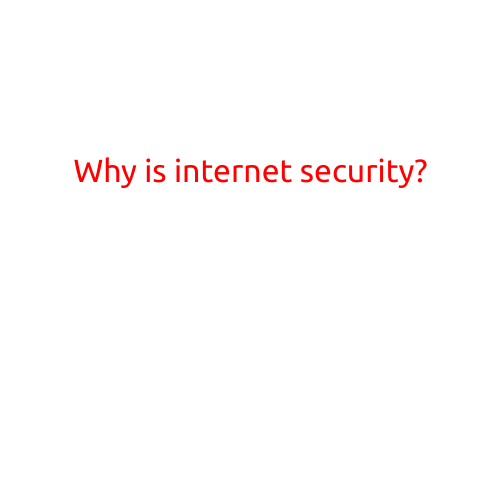
Why is Internet Security So Important?
In today’s digital age, the internet has become an integral part of our daily lives. With the rise of online shopping, banking, and social media, it’s no surprise that the internet has also become a breeding ground for cyber threats. As a result, internet security has become a top priority for individuals, businesses, and governments alike.
The Risks of a Weak Internet Security
The consequences of a weak internet security system can be severe. Hackers can easily breach your personal and financial information, leading to identity theft, financial fraud, and reputational damage. Moreover, a single cyberattack can spread quickly, causing widespread disruption to critical infrastructure, such as power plants, hospitals, and financial institutions.
The Benefits of Strong Internet Security
On the other hand, a strong internet security system offers numerous benefits. Here are some of the most significant advantages:
- Protection of Personal Data: Strong internet security ensures that your personal data, including passwords, credit card numbers, and social security numbers, remains confidential.
- Prevention of Financial Losses: By preventing hackers from accessing your financial information, you can avoid financial losses and prevent identity theft.
- Reputation Preservation: A strong internet security system helps to prevent cyberattacks that can damage your reputation and harm your business.
- Business Continuity: In the event of a cyberattack, a strong internet security system can help to quickly identify and contain the threat, minimizing downtime and business disruption.
- Compliance with Regulations: Many industries, such as healthcare and finance, are subject to strict regulations regarding data privacy and security. A strong internet security system helps to ensure compliance with these regulations.
Common Internet Security Threats
Cybercriminals use various tactics to breach internet security, including:
- Phishing: Scammers send fake emails or messages that appear to be from a legitimate source, asking you to reveal sensitive information.
- Malware: Malicious software, such as viruses and Trojans, is designed to harm your computer or steal your data.
- Ransomware: Malware that encrypts your files and demands payment in exchange for the decryption key.
- SQL Injection: Hackers use malicious code to inject data into a website’s database, exposing sensitive information.
- Cross-Site Scripting (XSS): Hackers inject malicious code into a website, allowing them to steal user data or take control of the site.
Best Practices for Internet Security
To protect yourself from these threats, follow these best practices:
- Use Strong Passwords: Use unique and complex passwords for all accounts, and change them regularly.
- Keep Software Up-to-Date: Regularly update your operating system, browser, and software to patch vulnerabilities.
- Use Antivirus Software: Install and regularly update antivirus software to detect and remove malware.
- Be Cautious with Links and Emails: Avoid clicking on suspicious links or opening attachments from unknown sources.
- Use a VPN: Use a virtual private network (VPN) to encrypt your internet connection when using public Wi-Fi networks.
In conclusion, internet security is crucial in today’s digital age. By understanding the risks and benefits of strong internet security, and following best practices for internet security, you can protect yourself and your business from the ever-evolving threats of cybercrime.

